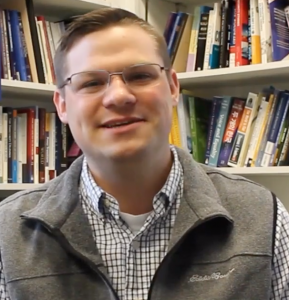Interview with PSIA alum Second Lt. Nathan Baker
Achieving his professional goals since UNG graduation required a lot of work and determination along the way for Second Lt. Nathan Baker. From studying abroad, to excelling in the Cadets Corps, to utilizing networking opportunities provided by UNG, Lt. Baker credits the PSIA program for providing him with the essential skills necessary to succeed in the classroom and following graduation. Check out our interview where Baker describes the challenges toward realizing his academic and professional.
Baker is a 2018 graduate of the international affairs program.
Dr. Chris Kroh interviewed Lt. Baker
What it has been like to serve as aide-de-camp to General Blackstock since your graduation?
Second Lt. Nathan Baker: “In the United States military, being selected to serve as an Aide-de-Camp is considered to be a position of honor. I serve as the Aide-de-Camp for Brigadier General Tom Blackstock, who is the commanding general of the Georgia State Defense Force. Essentially, general officers within the military are entitled to having an Aide-de-Camp, who is a junior officer that helps manage their daily duties and responsibilities related to their command.“
What are your responsibilities and how did your PSIA classes helped prepare you for them?
Lt. Baker: ‘The Georgia State Defense Force is one of the major subordinate commands of the Georgia Department of Defense, and plays a major role in assisting state and local agencies and civil relief organizations to ensure the welfare and safety of the citizens of Georgia in impending and actual emergencies. (For the Mission Statement of the Georgia State Defense Force, Click Here) We often get called to service during Hurricane season in affected areas, where we respond in conjunction with the National Guard and other government agencies, such as FEMA or GEMA, and other civilian organizations like the Red Cross. Seeing how all of these entities interact with one another and how resources are gathered and distributed, the rules governing what can and cannot be done and by whom is all complimentary of the PSIA education that I received at UNG.”
Why did you decide to pursue a PSIA degree at UNG?
Lt. Nathan Baker: “I decided on pursuing International Affairs before starting as a student at UNG. In the summer prior to starting my Bachelor’s, I had an opportunity to go on a mission trip to Romania with my grandmother. This was really my first chance to experience a different culture, and interact with people from a different part of the world. That trip and experience really peaked my interest in studying international affairs at UNG.”
What study abroad opportunities did you have while at UNG?
Lt. Baker: “I studied abroad through the Russian Studies in the Baltics program offered by UNG, in the summer following my sophomore year at UNG. The program was fantastic for immersing myself in Eastern European culture and advancing my Russian language understanding, which is what I hoped to gain from my study abroad. However, I remember the experience being incredibly stressful and, at times, frustrating. I lived with a Russian host-family throughout the entire study abroad, and had to completely learn how to function within their society.”
How did the PSIA department help prepare you for that and could you discuss how studying abroad shaped later decisions and who you are today?
Lt. Baker: “I studied abroad before getting into the bulk of the upper-division PSIA courses, so I believe that my study abroad experience really laid the foundation that I built-upon with the courses that I took in my last two years at UNG. It is fantastic to have a study abroad experience that can be used to relate and advance the concepts and theories that are discussed within the classroom in the later-PSIA courses.
After Romania, did you have any other opportunities to study abroad? How the PSIA department and its classes help prepare you for those opportunities?
Lt. Baker: “My internship, which I completed just before my graduation, is really what I used to tie my entire experience in the PSIA department together. I was blessed to do my internship with the NATO School in Oberammergau, Germany, where I had an opportunity to live and work with NATO professionals from every NATO member state. Interacting with military personnel from around the world, all working together toward a common collective-security mission was the best experience to relate and correlate my formal education in a real-world environment. I believe that internship really did a good job to bring together concepts from the different PSIA courses.”
What other opportunities for involvement did you have at UNG that were beneficial to you as a student and in your subsequent career?
Lt. Baker: Absolutely. I took advantage of a lot while a student at UNG. I was a member of the Student Government Association for a few years. I initially got involved as a freshman, as a way to get plugged into the university, but ended up thoroughly enjoying it, and felt as though I was genuinely contributing to the University. I attended the conference on Student Government Associations at Texas A&M University, and helped network and learn about the Student Government Process at universities from around the country. I also participated in my senior year with the UNG Model UN club, and attended a conference with them in Charlotte. That was a great experience – I wish I had known about them sooner!”
You were also active in the cadet program?
Lt. Baker: “I was VERY involved in the Corps of Cadets, where I served as the Brigade’s Executive Officer my senior year, the second highest position of leadership, responsible for the day-to-day operation of the Corps of Cadets. I attended one of the cadet conferences at the National Defense Academy in the Republic of Georgia during spring break of my Junior Year, and gave presentations about the military officer-producing programs here in the United States. I helped participate in and host a similar conference in the fall of my senior year when we brought a bunch of international cadets to UNG to participate in a week-long symposium. The relationships I made with a lot of those international cadets and military officers and soldiers from around the world at both of those conferences has proven valuable more than once when I have traveled abroad, and linked-up with friends in their home countries and met their families.
Were there any new perspectives or new ways of thinking you learned from your PSIA classes at UNG that provided you with skills that you continue to utilize?
Lt. Baker: “There are two professors that stand-out in my mind for their passion for what they taught: IR Theory with Dr. Armstrong Williams, and the IA Capstone with Dr. Miner. I look up to these two professors a great deal. I believe the PSIA program absolutely helped me develop a greater sense of analysis. A lot of what was discussed in the upper-division political science courses involved a lot of theory, and so by virtue involve a lot of opinions. Being able to research and generate an opinion or stance about a topic, defend that opinion, or using research as a means to counter a different opinion were all skills that became valuable and useful in the PSIA program. These same analytical and written skills, I intend to use in graduate school, pursuing a Master’s degree.”
What would be your advice to students who are in the PSIA program or who are thinking about a PSIA degree?
Lt. Baker: “Don’t wait! If you know that you intend to pursue a PSIA degree, get started taking the major-related courses as early as you can. I put this off, and by my senior year, all that remained in my plan of study were the most-difficult upper division political science courses, which each require a great deal of research, reading, and writing. I didn’t sleep much my senior year, and if I could go back in time, I would have made a greater effort to try and divide up these upper-division courses, so that I didn’t end up trying to do them all at once!”



